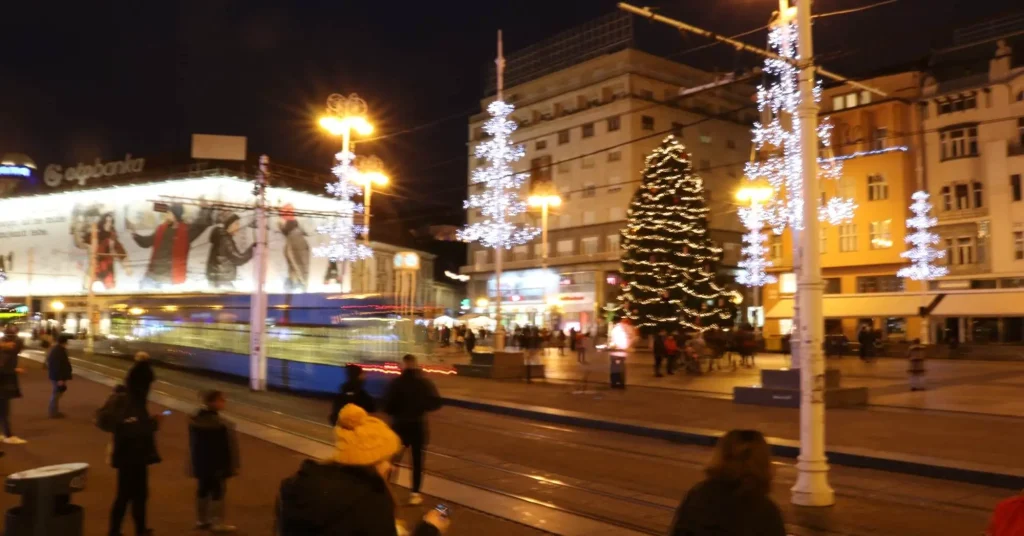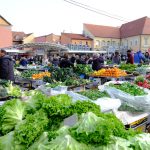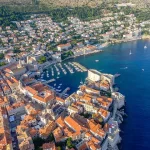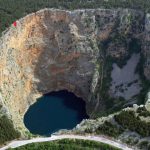There are things one must see or experience to confirm something that is said. About Croatia, I have already been able to corroborate almost immediately the turquoise color and transparency of its waters, as well as many of its customs and traditions. But being a person who by will has stopped going out constantly at night, it was difficult for me to take for granted the security that one has when walking at night in Croatian cities and towns. Even more to consider Croatia as the second safest European country to walk alone at night.
I remember when I was living in Rijeka and studying the Croatian language, my teacher asked the class to survey locals about life in their country. I did not know many people back then, as I had just arrived just a few months ago, in 2019. I had recently joined a film club at the Faculty of Philosophy and Humanities, and curiously I was the only male in the group. I asked three questions and emailed them to each one of the girls in my group. One of those questions was: ”What do you consider the most positive thing about living in Croatia?” I may be wrong, but I remember almost with absolute certainty that all the answers to that question revolved around the safety of going outside and walking alone.
I know very well that historically, answering the question about safety on the streets can vary if the person surveyed is a woman or a man. I don’t like talking assumptions, but living 24 years in Lima, Peru, I know that the reality of walking alone at night is uneven. My biggest fear was being mugged, but for a woman, it was being mugged, kidnapped, harassed, and more than it costs me to continue writing. I believe that the value of living in a place where you feel safe to walk alone at night greatly reflects the level of security in your country or city. Unfortunately, crime rates are measured differently and one thing is how safe you feel on the street and another is how safe your country really is.
Although the statistics to be presented in this article are prepared based on numerous factors and yield general results, it was enough for me to know the responses of my colleagues from the film club, as well as to see my 7-year-old neighbor returning home from school at 9:00 p.m., or walking with my cousins from the City Center One Mall in Split to the highway for us to wait for the bus almost at midnight, and many other experiences in these last two years, to confirm that walking alone at night through the streets of Croatia is safe indeed, and to be considered the second safest European country is not an exaggeration at all.
Regarding the Numbeo crime statistics published on November 15th of this year, and subsequently represented on a map and shared by Landgeist three days ago, the web portal commented the following:
”How safe one feels to walk alone on the streets at night, doesn’t necessarily say anything about the crime rate in the country. But it does give a very good sense of how safe people feel in their country. Although both are probably closely related, having a low crime rate doesn’t necessarily mean that people will also feel safe. Crime rates can give a skewed view in countries where crime is under-reported or people have lost faith in law enforcement and don’t report crimes anymore.
Apart from crime, there are other factors that can affect one’s sense of safety, such as the presence of dangerous animals or poor urban planning that makes cities feel less safe than they are.
Of course, this statistic can vary from city to city and even between neighborhoods. Not just that, it can also vary depending on the demographic you ask. Data on these detailed statistics are non-existing for most countries. So keep in mind that this map only gives a very general view of how safe people feel to walk the streets alone at night per country.
Regardless of whether you think crime rates and how safe people feel are closely connected or not, let’s have a look at the map. Which will just give us an idea of how safe people feel to walk the streets alone at night.
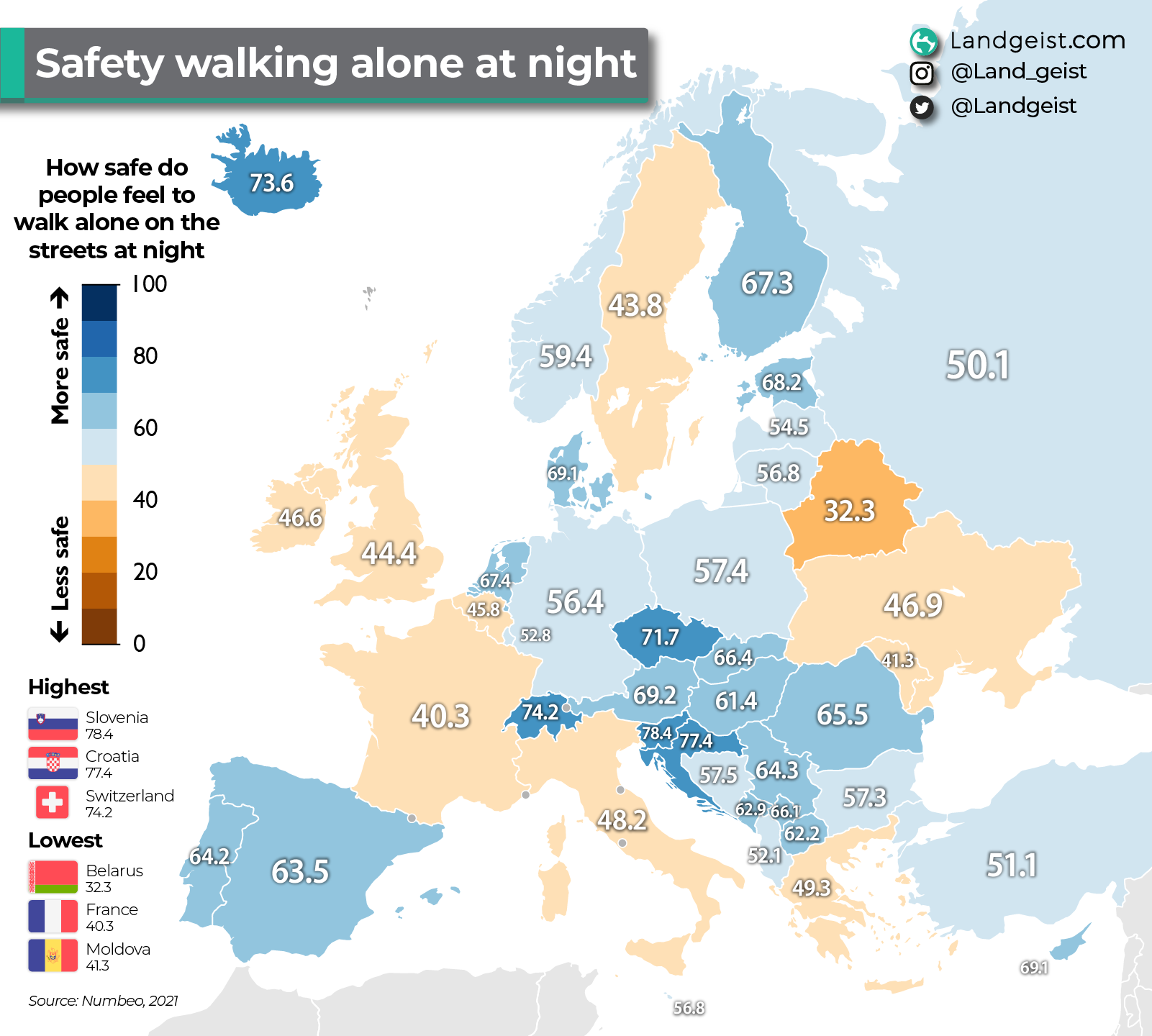
Landgeist map, which shows Croatia as the second safest European country for walking alone at night with a score of 77.4.
We recently looked at how safe people in Asia feel to walk alone at night. As you can see, this map of Europe shows much smaller contrasts than the Asian map. No country in Europe scores over 80, but there are several countries in Asia that do score over 80. On the other hand, there is only one country in Europe that scores below 40. In Asia, there are quite a few countries that score below 40.
At the bottom end in Europe, there is one country that scores far lower than any other country: Belarus (32.3). The next 2 countries also score much lower than others: France (40.3) and Moldova (41.3). Sweden, the UK, Belgium, Ukraine, Ireland, Italy, and Greece also don’t score very well.
The highest scores can be found in Slovenia (78.4) and Croatia (77.4). The only ones to score over 75. Switzerland, Iceland, and the Czech Republic also score very well. The majority of the European countries seem to be scoring fairly OK, with most of them scoring between 50 and 70”.
For some, it may be one more curious fact. But Croatia is a country that from Zagreb, Slavonia, Istria, and even Dalmatia, can boast enviable numbers of tourism throughout the year. Nightlife is an important aspect of that reality, whether it is coming home from a rave, a nightclub, a bar, or a soccer game. Being the second safest European country for people to walk alone on the street at night cannot be overlooked, and it reinforces the idea that Croatia could be promoted as a safe destination for all, but it is a question of whether those who are to charge of showing the country to the rest of the world consider whether it is something important or not. We’ll see.
For more on lifestyle, follow TCN’s dedicated page.

